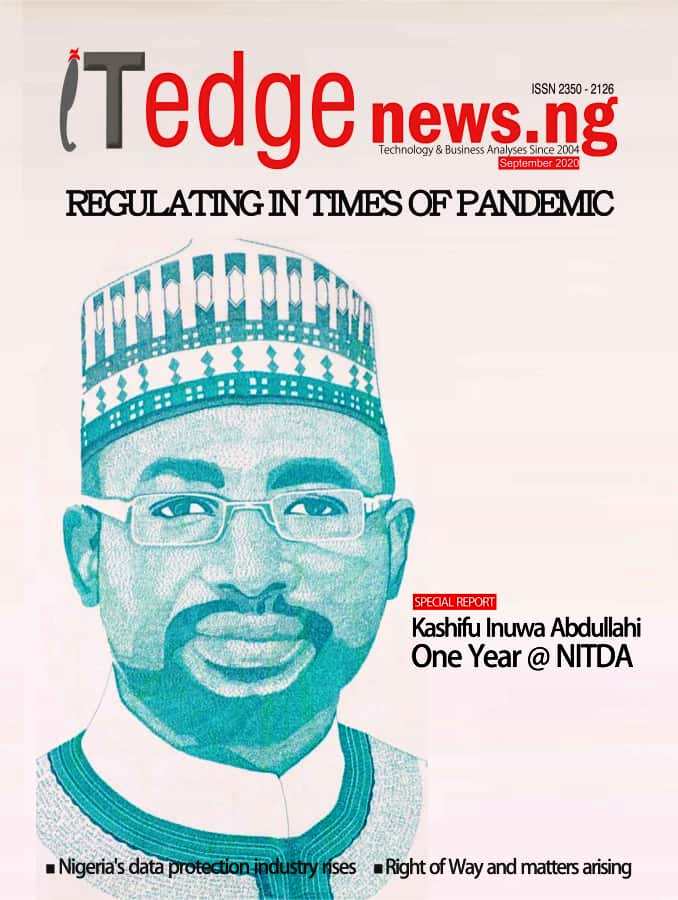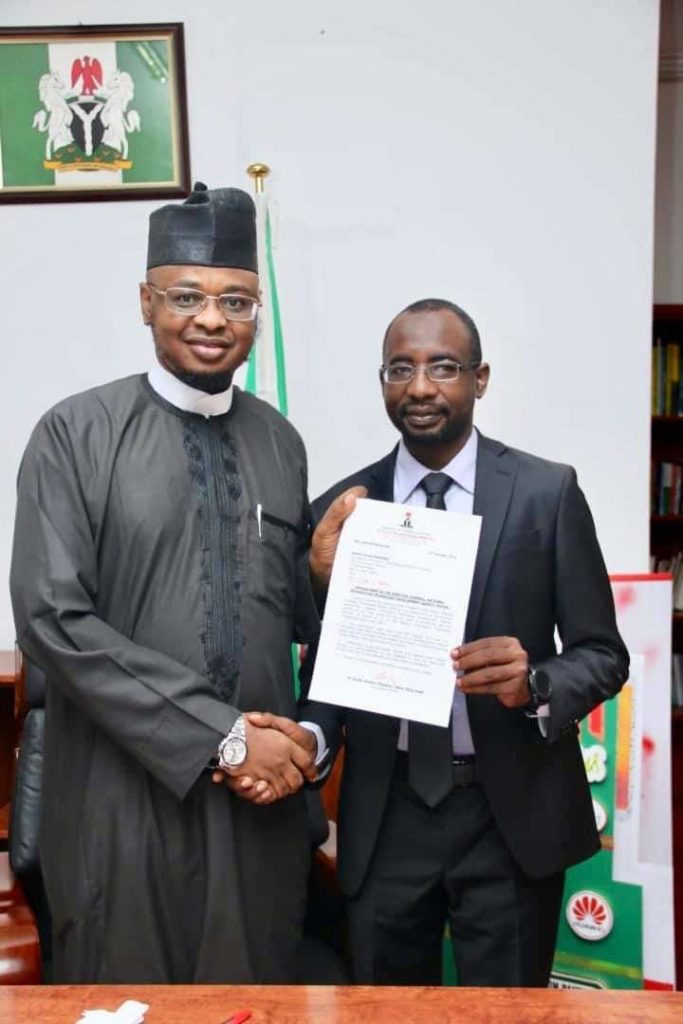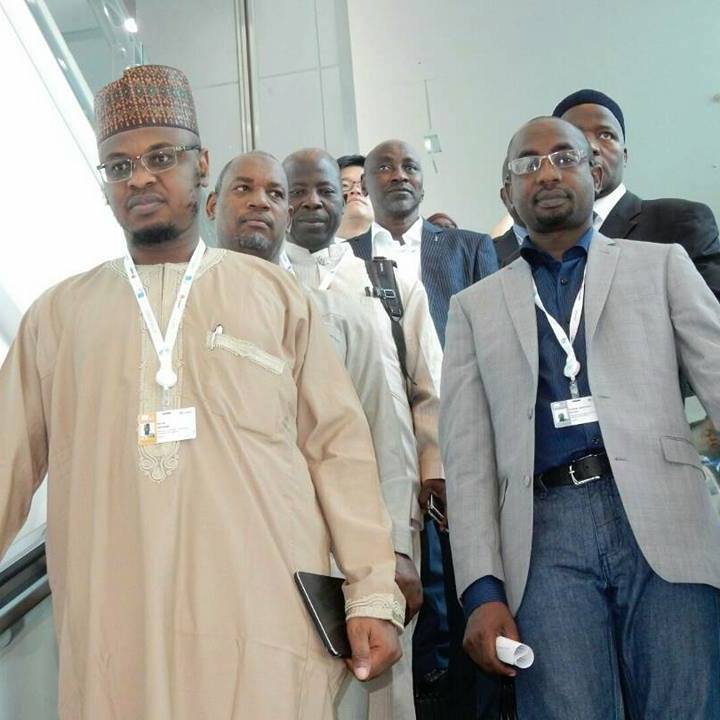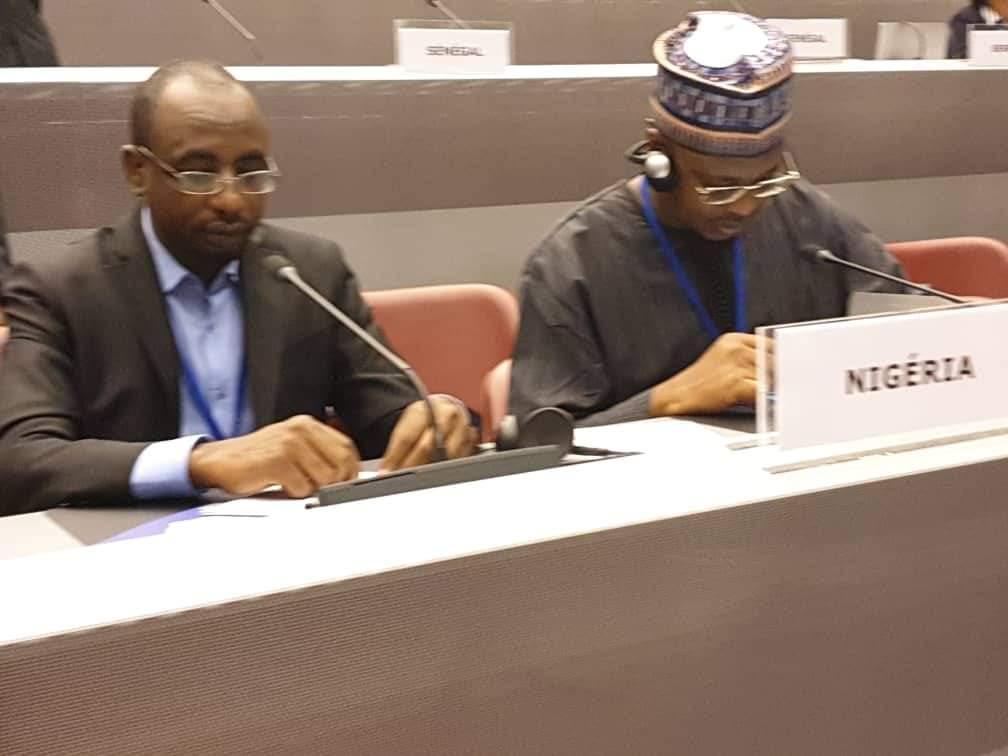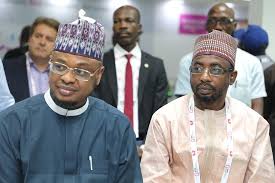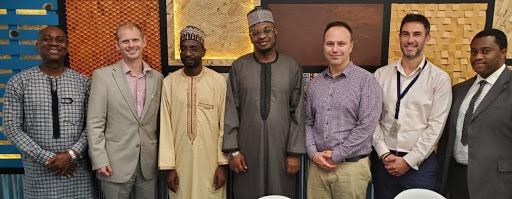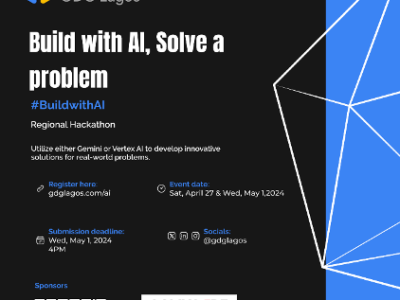REGULATING IN TIMES OF PANDEMIC
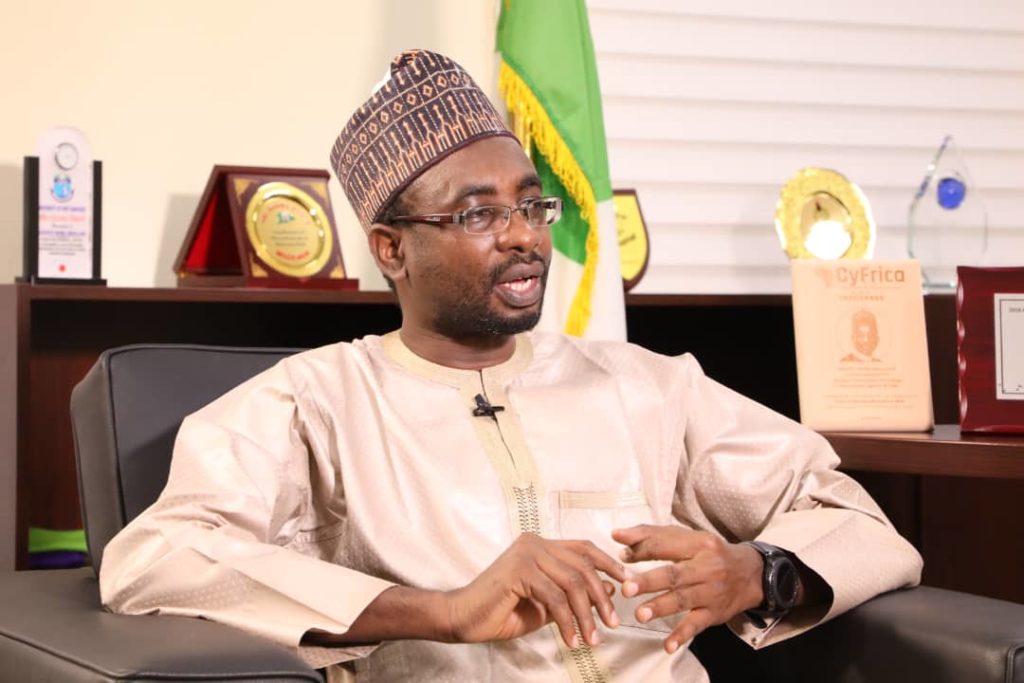

It is one year since Mallam Kashifu Inuwa Abdullahi resumed office as the Director General of the National Information Technology Development Agency (NITDA). In this eTerview, he speaks on the challenges of regulating a sector that is perpetually in transition; how NITDA has responded to COVID-19 to expand the window for tech innovations and why leadership sits well on youth, particularly in the ICT sector. He shares with Olusegun Oruame.
How is COVID-19 impacting on your ability to regulate and carry out development programmes?
Thank you very much and thank you for having me. Like they say, in every pandemic or in every difficult situation, there is a hidden opportunity or a silver lining. For me, the COVID-19 has made our activities more profound.
Before the pandemic, technology generally is seen as emerging, in terms of people embracing it, or people digitizing their processes. People were generally already using technology to enable most of their processes.
But when the pandemic hits, it accelerated the adoption of technology; and then of course, you have to accelerate in terms of regulation. They say technology changes at the speed of light while law changes at the speed of policy makers. You can’t always predict how soon technology will change. But, you know, most of the time, in law, you will see there is a lacuna or a point at which you need to turn things around.
NDPR
With the pandemic, we had to find a way we can accelerate in terms of regulation. We started with the NDPR [Nigeria Data Protection Regulation], for instance; as a result of the pandemic, there was huge data collection from the frontline MDAs [ministries, departments and agencies]and even other people trying to help. They collected information, personal information, so to speak. We started with issuing a supplementary regulation for public institutions because you need to give them some special considerations as there was a need to balance between issues such as live andlivelihood, privacy and the rights around personal informationeven in the face of the pandemic – so we started with the NDPR.
Cybersecurity
Also, we looked at the cybersecurity in general. Because of the way people were embracing technology; the rise in technology adaptation, there was a surge in cybercrime as well. Cybercriminalstriedto exploit the situation. Because of the pandemic, people were panicking. The pandemic created uncertainty and people were and are still looking for help. Some criminals exploit the situation and globally. There has been significant increase in cybercrimes. You will see a lot of images about COVID-19 or something around that online. Butsome of those links or sites are weaponized with codes that can steal information when you click on them.
The pandemic also led to scarcity of protective equipment and other essentials which cybercriminals readily tried to exploit. There were cases whereby people will tell you they have that equipment, you give them your card details, you even make payments and at the end, they won’t deliver anything, because they were just exploiting the situation to come up with those fraudulent activities.
So, we had to scale up our cybersecurity responses to tackle the problem. We deployed three strategies. Firstly, is awareness – we increased our awareness campaigns. We issued public notices and so on. Secondly, is about prevention. On the prevention aspect, we issued a guideline. Even as we speak now, there is new policy and guideline the ministry is working on to address remote working and information security in general. We have sent the draft to the Honourable Minister and the ministry is doing the final touches.
Then, we also upgraded our CERRC – the Computer Emergency Response and Readiness Center, which was launched this week. All theseare to help address the negative impacts of the pandemic in terms of cybercrimes.
Digitization means new opportunities
We have also looked at COVID-19 from the perspective of new opportunities. What can we do to get the most out of this pandemic because as it accelerates digitization that means it is going to open opportunities in that area?
We came up with the Business Process Outsourcing [BPO] Guideline for which we did a stakeholders’ review and it has reached an advancedstage so that very soon, we will start its implementation. That will help us come up with new decent jobs for our younger generation because we have a competitive age in Nigeria.If we look at the key players in that market segment like India and Bangladesh, we have more English-speaking people and we have a better time zone than those countries. With these advantages, there is a competitive edge we need to leverage on.
With pandemic, we are alsolooking in the area of emerging technologies. We are working on strategies for artificial intelligence. We are working on a blockchain strategy and alsohow to get the most out of this digitization. The pandemic is helping to accelerate innovations, acceptance or how people embrace technology and so we are doing a lot in terms of regulations as well.
“I have to deliver on the responsibilities”
You are one of the youngest leaders in the country; you are also one year in office. What has it meant to you being young in a country like this and being put in a position to set agenda? What really moves you, what are the things you really want to look back at and say yes, I did it?
There are two things. Firstly, I have a name I need to protect because as I was growing up, my father always told me, be honest in whatever you do. He used to tell me if you lie one time you have to lie ten times to cover that lie but if you always say the truth you have nothing to hide. So, I have a name to protect and this is a responsibility given to me – I have a family name to protect.
I need to also demonstrate that the person who recommended me, that’s my mentor and my boss, the Minister of Communications and Digital Economy [Dr Isa Ali Ibrahim Pantami], he recommended my name to the president, I need to also protect that confidence he has in me because if I failed it is not that I have failed myself, I’m also failing him for that recommendation he made.
Also, I have to protect the integrity of the youth, they are a lot of people sayings that the youth cannot do it, they don’t have the experience or they don’t have the exposure and so on, so with the “Not Too Young To Run”, I think this government also understands that sometimes age is just a number – So what matters is whether you can deliver. I need to protect that trust and confidence because if I failed, I’m not failing myself I’m failing my family, I’m failing the person that recommended me I’m failing the person that appointed me and I’m failing the youths in general – that is, the generation that I represent. These four things drive me and these are the four things that keep me awake at night to make sure I deliver onthe responsibilities.
From PANTAMI TO ABDULLAHI – Fostering a culture of leadership for development
Pantami on Abdullahi.
Kashifu Inuwa Abdullahi emergence as the Director General/CEO of the National Information Technology Development Agency (NITDA) in 2019 has helped to strengthen the discussions on leadership and succession within the Nigerian nay African context of governance and leadership; sustainable policies and management.
The question was why him? In nearly its two decades of existence, the NITDA has been led by men with visible grey hairs.
In 2016, when Dr Isa Ali Ibrahim Pantami was appointed as the Director General/CEO of the National Information Technology Development Agency (NITDA), he would be first taste of young leadership that the IT agency would have.
Pantami readily became an insignia of ‘Change’ bringing to the office an undeniable sense of vim and a robust regulatory disposition that immediately set the NITDA against established interests.
“People want change but change is the most difficult thing to accept,” Pantami once told IT Edge Newsin Abuja.
No IT regulator had enforced NITDA’s mandate like Pantami; particularly, as it has to do with Public Sector IT Procurement. It was a change that was resisted notably by ministries, departments, and agencies (MDAs) but for which Pantami stayed the course, undeterred.
As Prof. James PS, Chairman, Human Resources Management, T A Pai Management Institute, argued in one essay on leadership: “Leaders perform three fundamental roles – direction setting, creating alignment and creating engagement with people.”
Perhaps, the most outstanding legacy of the Pantami’s years in NITDA is that he displayed the competency for setting direction to drive the agency’s vision statement.
His appointment as a Minister of the Federal Republic and expected departure as Director General/CEO of the NITDA, therefore, raised genuine concerns as to the future of the agency.
Enter, Abdullahi. When he took office as the new IT Sheriff, he was walking into a known path having worked closely with the out-going DG/CEO as the Technical Assistant (TA).
His appointment in 2019 negates the norm. But it underscored a significant recognition for the vast opportunities in developing leaders among Africa’s large youth population who, given the opportunity, are able to constitute a new generation of leaders.
The young DG/CEO acknowledged this in his statement to IT Edge News thus:
“I have a name to protect and this is a responsibility given to me …. I need to also demonstrate that the person who recommended me, that’s my mentor and my boss, the Minister of Communications and Digital Economy [Dr Isa Ali Ibrahim Pantami], he recommended my name to the president, I need to also protect that confidence he has in me because if I failed it is not that I have failed myself, I’m also failing him for that recommendation he made.
“Also, I have to protect the integrity of the youth, they are a lot of people sayings that the youth cannot do it, they don’t have the experience or they don’t have the exposure and so on, so with the “Not Too Young To Run”, I think this government also understands that sometimes age is just a number – So what matters is whether you can deliver. I need to protect that trust and confidence because if I failed, I’m not failing myself I’m failing my family, I’m failing the person that recommended me I’m failing the person that appointed me and I’m failing the youths in general – that is the generation that I represent.”
Abdullahi’s entry reinforced one of recurring debates around leadership: whether it is teachable, transferable or remains a manifestation of what some people are inherently born with.
Mentored by Pantami, he had benefitted from the exposure that his position as a Technical Assistant (TA) to the out-going NITDA’s boss had offered him. Abdullahi also made the top list for Pantami’s choice in leading NITDA after him.
The confirmation of that choice,through Abdullahi’s official appointment, upheld the need to deliberately foster a culture of leadership. Frequent policy somersaults and management misdirection in most of Africa’s establishments, whether public or private, are often the consequence of lack of strategies to transit leadership to trusted and capable hands.
A scholar and a technocrat himself, it would appear Pantami was clearly not going to allow this lapse happen as he departs NITDA – he clearly leaned towards the belief that leadership can be cultivated; and in younger persons.
“He has been consistent, always stayed in touch, patient to learn and reliable,” Pantami told IT Edge News during an informal interaction last year in Dubai, UAE.
Pantami, now the Minister of Communications and Digital Economy, appears persuaded by the argument that ‘to lead requires courage and commitment; and equally loyalty and trust,’
To him, it is the business of progressive leaders to nurture these traits in younger persons and motivate them to take up leadership positions.
As Sam Adeyemi, PhD Student, School of Business & Leadership, Regent University, noted at the World Economic Forum (WEF) in 2017: “The cultivation of leaders with exceptional character and skills is critical to Africa’s development. Africa’s development partners should recognize that it is too late to teach someone who occupies a high position in government how to lead during side talks at global events. They should also bear in mind that there has to be alignment between the sense of identity of the leader and that of the followers for leadership to work.”
He added: “Opportunities for developing leaders [in Nigeria and rest of Africa] have never been greater in our increasingly complex world. Change is possible.”
In NITDA, Pantami has demonstrated the point that incompetence in leadership in most African countries is not necessarily the problem of people who occupy positions in government; it is a reflection of absence of a leadership culture in government and in private setting.
Abdullahi’s major concern is to deliver on the responsibilities he has been entrusted with. The onus of leadership is on him, and to use his own words: “protect that confidence [of those who recommended and appointed me] and also to protect the integrity of the youth – the generation that I represent.”
One year on, his critics agreed he has carried the baton with a sense of focus and humility – an affirmation of the confidence in the man who walked the office before him. Abdullahi has no choice than to succeed.
IndustryViews:
“[Abdullahi] has brought his technical skills to bear to bring about the required focus of NITDA.”


CAPDAN’s Ojikutu 

DSPL’s Tunde 
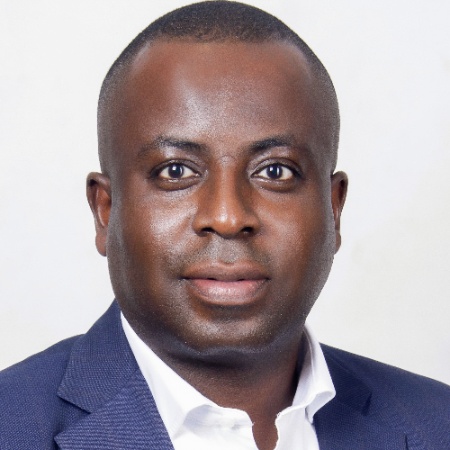
ATCON’s Teniola,
”Nigeria’s ICT industry continues to grow despite hiccups. Much of the growth is driven by the resilience of the industry players and robust regulations.
Operators believe the industry could further grow beyond its current 17% contribution to the country’s GDP. They look to collaborating more with the regulator to achieve results.
The National Information Technology Development Agency (NITDA) has continued to provide leadership and sense of direction for the industry, said President of the Association of Telecoms Companies of Nigeria (ATCON), Olusola Teniola
For him, the Director General, NITDA, Kashifu Inuwa Abdullahi “has brought his technical skills to bear to bring about the required focus of NITDA in the changing landscape dominated by data, Artificial Intelligence, Machine Learning and Industry Revolution 4.0.
“NITDA has introduced digital skills training hubs to penetrate the knowledge based society mindset shift required to leverage the new norm and the technologies that drive this. Our observation is that for post COVID-19, a synergistic approach to the digital transformation should be the foremost focus of NITDA in conjunction with NCC and NBC. This is in recognition that technology has converged and this needs to reflect in policy making decisions in a consultative manner to provide legitimacy and buy-in by private sector actors.
Going forward, NITDA should embrace the adoption of technology to drive e-Gov across all MDAs and to enforce local content development and operations that provides our youth the opportunity to have jobs and be employed.”
The president of the Computer and Allied Product Dealers Association of Nigeria (CAPDAN), Ahmed Ojikutu, expressed similar viewpoint. NITDA is increasingly becoming more visibly assertive with its mandate, according to Ojikutu.
He said Abdullahi has brought some level of dynamism expected of his age. But Ojikutu wants Abdullahi’s NITDA to be more involved in supporting members of his association who he described as the major stakeholders in semi-formal ICT sector. “We want the agency to not only look at the formal sector but also the semi-formal sector of ICT. We want the NITDA and Ministry of Communications and Digital Economy not to ignore our sector as the sector is adding value to the economy. We look to more support from the regulator. We request for serious holistic policy direction towards the informal sector and players in Ikeja Computer Village, Alaba International Electronic Market, and other places so that we can be accommodated in government plans. We can say that this DG has proven to be very supportive to many stakeholders. We hope to work closely with the NITDA. Tunde Balogun, CEO, Data Services Protection Limited (DSPL), thinks the NITDA has remained proactive in trying to nurture the country’s nascent data protection industry to maturity.
DSPL is one of the 70 licensed Data Protection Compliance Organizations (DPCOs) in Nigeria.
Balogun said the enviable position by Nigeria’s data protection industry as the leader in Africa points to the measures adopted by the IT regulator. He said the NITDA, starting with Dr. Isa Ali Ibrahim Pantami and now Abdullahi, has demonstrated a strong capacity to carry through with the Nigerian Data Protection Regulation (NDPR) 2019 and to provide a support stream to all stakeholders in the entire value chain including DPCOs.
There has been an increase in the number of organizations carrying out data protection audit filing as required under the NDPR and the degree of compliance is also improving. This is because the regulator is assertive and proactive enough,” said Balogun.
Kashifu Inuwa Abdullahi – One Year @ NITDA: A VISION OF YOUTH, TECHNOLOGY AND FUTURE
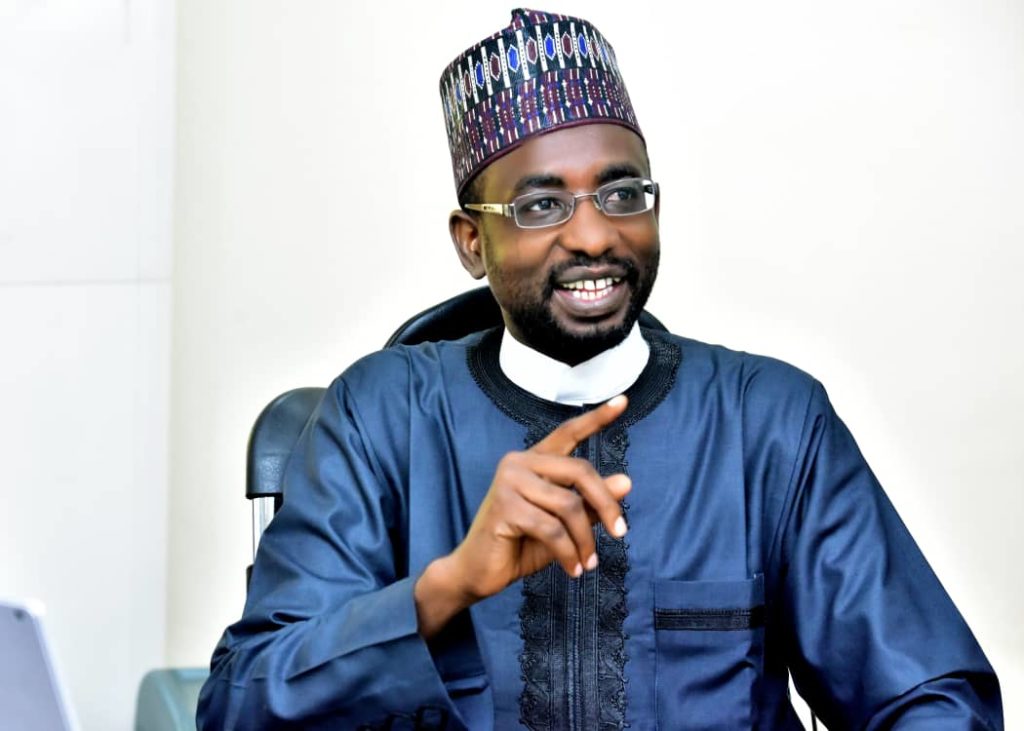

One year ago, Kashifu Inuwa Abdullahi resumed office as the Technical Assistant (TA) of the Director General of the National Information Technology Development Agency (NITDA). But he would end that day with a new and higher responsibility as the newly appointed Director General of NITDA – Nigeria’s IT clearinghouse.
When the official news of his appointment as Director General/CEO, National Information Technology Development Agency (NITDA)by President Muhammadu Buhari rented the airwaves that late evening of August 20, 2019, Abdullahi knew history was beckoning on him.
No one his age and background had ever led the almost two decades old agency. His appointment represented a shift in generational reckoning within government and a surprising acceptance by the country’s decision makers to get very young people on board the ‘Change’ train.
Just turned38 years then, Abdullahi had been recommended by the outgoing Director General/CEO, NITDA, Dr Isa Ali Ibrahim Pantami, who himself, had just been appointed Minister of Communications (now renamed Ministry of Communications and Digital Economy). Pantami’s recommendation passed. It will be the first time an out-going boss will make such recommendations. The presidency approved the recommendation for in its wisdom: technology belongs to youth. Abdullahi came to office, young, tutored and exposed to the guidance of Pantami who had accepted to serve the country at a higher level as a Federal Minister.
Abdullahi’s appointment, even to him, was a surprise. He would admit this much thus: “This isn’t something that I expected or even envisaged. It was indeed a pleasant surprise. It however, shows the confidence my boss and mentor, Dr Isa Ali Ibrahim Pantami, has in my ability to the extent of recommending me to President Muhammadu Buhari, to take a giant leap step into his shoes. It is a great honor, and I am putting in my best not to disappoint the expectation of my boss and mentor, Mr. President, Nigerian Youths as well as the country as a whole.”
Abdullahi came to office with a burden of responsibilities, but he came prepared, mentored by his boss, the strong-willed Pantami, who had reworked NITDA to good results like no other director generals before him.
In two years, Pantami had made a somewhat compliant NITDA to assert its regulatory powers and affirmed its development mandate. The results were outstanding. Don’t mess with NITDA. The fear of NITDA had become the beginning of wisdom for many MDAs, who hitherto, treated the IT regulatory agency with disdain.
When Abdullahi came to office, he carried a flaming baton that must not quench.
You will be wrong to think the new IT sheriff is a novice in the industry. Young! Yes! But Abdullahihas worked his way up, gathering experience within the IT industry managing projects at Galaxy Backbone Limited and the Central Bank of Nigeria (CBN) among others.
“As you may be aware, I am not new in the Nigeria’s IT industry. I am at home being at the helm of affairs in NITDA. As a person that is open to new approaches and strategies, with the experiences I have gained for the last 15 years in the IT sector spanning between the private and the public sector and through unceasing study, my team and I have worked diligently to ensure the continuous development of the IT sector in Nigeria over the past 10 months. Remember, I picked it up from a good place to consolidate upon, considering the foundation laid by my boss and mentor, Dr Isa Ali Ibrahim Pantami,” said Abdullahi.
The drive for IT compliance remains strong
In the last one year, there has remained a consistent focus on asserting NITDA’s regulatory mandate in IT procurement – one area his predecessor fought an untiring battle to ensure federal ministries, departments and agencies (MDAs) comply to the statutory provisions on IT procurement.
In May, the agency reported an assessment and clearance of 62 IT related projects worth N1.16 trillion for January through May. The report was a consolidation of NITDA’s persistence at ensuring compliance by MDAs to stave off corruption and save the country money.
In 2019, during eNigeria, President Muhammadu Buhari revealed that the IT clearinghouse has saved the Nigerian government over N16.8 billion through a more efficient procurement processes for ICT projects carried out by all MDAs. It was an affirmatory testimonial of good work by Mr. President himself on NITDA that Abdullahi has consolidated on.
For the NITDA’s boss staying focus on the agency’s mandate remains a mantra that is not about to change. NITDA’s mandate drives the focus inherently designed to meet government’s overall objective for national development. His words:
“You may be aware that NITDA is implementing a strategic roadmap for the development of Nigeria’s IT sector. It consists of 7 pillars that are in alignment with the 8 pillars of the National Digital Economy Policy & Strategy. The 7 key pillars of our Roadmap are IT Regulation, Capacity Building, Digital Inclusion, Digital Job Creation, Government Digital Service Promotion, Local Content Development, and Cybersecurity.
“We have rolled out several policies, regulations, and programmes, focusing on those areas. However, as the roadmap is set to expire this year as is the Nigeria Economic Recovery and Growth Plan (ERGP) which it draws from. NITDA has already commenced reviewing it as well as developing the next plan, which will soon be launched. It is in alignment with and takes cognizance of the National Digital Economy Policy and Strategy (NDEPS), the Nigeria Economic Sustainability Plan (NESP) and other important plans and policies of this administration.”
Data protection compliance on the rise
Nigeria kicked off its data protection journey in January 2019 to join the rest of the more forwardly-looking international community. Nigeria’s principal data protection legislation is the Nigeria Data Protection Regulation 2019 (“NDPR”).
“The NDPR was issued by the National Information Technology Development Agency (“NITDA/the Agency”) on 25 January 2019 pursuant to Section 32 of the NITDA Act 2007 as subsidiary legislation to the NITDA Act 2007.Jul 6, 2020.”
To NITDA’s credit, the NDPR goal is to ensure that Nigeria is not isolated technologically and legally from global best practice concerning data protection.
By law, all public and private entities handling personal data of citizens or ‘data subject’ are expected to submit a data protection audit within specific time frame.
Last year NITDA licensed 27 Data Protection Compliance Organisations (DPCOs) with responsibilities that include helping public and private entities file their data protection audits.
This year, more DCPOs were licensed to make the number 70. As at today, licensed DPCOs have helped to create over 2,700 new jobs. Abdullahi’s NITDA has fostered a data protection industry that leads the rest of the continent and is valued at N1.8 trillion.
The pursuit of local content
Pantami staked up support for local content particularly for local original equipment manufacturers (OEMs). Abdullahi has pressed on in the pursuit of support for OEMs. Under him NITDA has continued to push for local OEMs to come first before foreign OEMs in terms of patronage by MDAs. The agency is also helping to promote support centres to help local OEMs improve customers’ experience for every purchase of local hardware.
“NITDA has demonstrated great support and has ensured improved patronage of indigenous OEMs in the last three years. It is a fact that the purchase of local devices by MDAs is unprecedented within these years compared to previous years before 2018. For instance, in 2015-2016 less than 250,000 devices were sold by indigenous OEMs. However, due to the intervention of NITDA, records show that in 2018/2019 alone OEMs sold three times the numbers sold prior to 2017 with about 778,886 of locally assembled devices sold in 2018 and 2019,” said Abdullahi.
He added: “However, there are some challenges with the implementation of the Presidential Executive Order 003 for promotion of local content in the procurement of MDAs and the NITDA issued Guidelines for Nigerian Content Development in ICT, which mandates MDAs also to purchase Nigerian hardware products. NITDA is implementing the Executive Order and Guidelines vigorously through active surveillance and IT Projects assessment and clearance process of the Agency. Nevertheless, procurement law requires OEMs to either bid directly or work with other contractors to bid to ensure transparency and value for money. If MDAs violate the process NITDA can then be notified for action.
“There is also a challenge with the quality of some of the indigenous brands. In an effort to address this challenge, in 2018, we mandated these OEMs to go through a rigorous certification process requiring them to have ISO 9001:2015 for quality management systems. This, we believe, will ensure they are able to provide products that meet quality and regulatory requirements always. Currently, only three out of 10 previously registered OEMs have been fully certified.”
NITDA, Digital Economy and skills retooling
In the last one year, NITDA has keyed into the ‘Digital Nigeria’ agenda helping to set the framework for public sector digitization and building a skill pool to leverage emerging opportunities in the knowledge economy.
On this plank, the agency has provided stream of digital trainings for Nigerians of diverse backgrounds across sectors; offered a portfolio of support to ICT hubs to substantially help generate more than 300,000 jobs even as COVID-19 bites.
Notably is the National Adopted Village for Smart Agriculture (NAVSA) programme. The NAVSA is designed to upskill farmers in order to help them improve productivity through SMART agriculture.
As part of its development interventions, the agency has in the last one year established Digital Capacity centres across all the country’s six geo-political zones; provided e-learning centres for various schools to help boost ICT capacity, access to knowledge and research contents.
As part of the digital economy agenda, artisans have featured remarkably in its training programme to help enhance capacity for service delivery. The digital training has a catchment that cuts across gender, demography and geographic space.
No less important, NITDA has continued to drive public sector initiatives geared at improving the country’s e-readiness and capacity to participate in the digital economy. According to Abdullahi, they include Nigeria e-Government Interoperability Framework (Ne-GIF); Nigeria Cloud Computing Policy (NCCP); Nigeria ICT Innovation and Entrepreneurship Vision (NIIEV); Framework and Guidelines for ICT adoption in Tertiary Institutions; Guidelines for Nigeria Content Development ICT as amended; and Data Protection Implementation Framework.
He said: “You may wish to know that even prior to the re-designation of the Federal Ministry of Communications, to include Digital Economy, NITDA has achieved a lot in that regard, through the implementation of a roadmap for the development of the Nigerian IT sector which consists of 7 pillars that are in alignment with the 8 pillars of the Digital Economy Policy & Strategy and the Nigeria IT Policy. For instance, in promoting a digital Nigeria, NITDA from August 2019 to date has launched and is implementing regulatory [these] instruments [as listed above].”
Promoting new skills and supporting startups
Under Abdullahi, NITDA has remained committed to growing the Nigerian startup ecosystem. The country remains atop of destinations on the continent for investments from venture capitalists (VCs). With millions invested already in nurturing and exposing Nigerian startups to the global community through platforms such as the GITEX, NITDA sees startups as the future of Nigeria’s digital economy.
The agency already has a strong tradition for supporting startups and innovation hubs, Abdullahi has remained unrelenting in ensuring that technology startups and hubs continue to flourish and attract international investments.
“Interestingly, Nigeria occupied the first position with a total investment of US $747 Million, followed by Kenya with a total investment of US $564 Million and Egypt that attracted a total investment of US $211 Million. In an effort to consolidate these efforts, we have a series of initiatives aimed at providing a conducive environment and support for the Start-up Ecosystem,” said Abdullahi.
He added: “These include:
- The NITDA Technology Innovation and Entrepreneurship Support Scheme, targeting startups hub owners and youth with talent and building their skills in high-demand skills;
- Policies such as Tax Incentives for startups, incentives for investors and access to market for innovation adoption;
- Establishment of Innovation and Research Fund to further catalyze the growth of startups;
- Development of an Innovation Portal to monitor the activities of the ecosystem;
- FinTech software, which is already exported;
- The innovation fund established by Government will reduce risk and attract FDI; and
- Establishment of the Tech4COVID19 Initiative to measure the impact of COVID-19 on the tech ecosystem and proffer solutions especially for startups. The committee has come up with a Strategic Plan to ensure we retain about 100,000 ICT Jobs and create an additional 30,000 in the Post COVID-19 Era. We have since initiated the implementation of these recommendations.
Facing COVID-19
For the young NITDA’s boss, COVID-19 has been both a challenge and an opportunity. NITDA unveiled a portfolio of initiatives to help technology business entrepreneurs stay afloat and leverage the emerging opportunities for new services resulting from the pandemic.
Abdullahi shared a ‘go-through’ list of the agency’s interventions to make COVID-19 a time of new opportunities.
“NITDA has launched several initiatives in order to ensure that technology continues to enable business continuity,” he said.
He added: “You may have followed some of our initiatives like:
- Tech4COVID19 Initiative – This initiative is set to measure the impact of COVID-19 on the tech ecosystem and proffer solutions especially for startups. The Committee we set-up has come up with a Strategic Plan to ensure we retain about 100,000 ICT Jobs and create an additional 30,000 in the Post COVID-19 Era.
- Virtual Startup Clinic – Startups where gathered, mostly young people to meet with mentors, successful entrepreneurs, investors, industry specialists, business consultants and hub operators with the goal of solving problems and challenges they were facing. We held two virtual startup clinics within a time frame of 1 month.
- Nigeria COVID-19 Innovation Challenge – An online innovation challenge was held to meet the challenges our society is facing as a result of the COVID-19 pandemic. 5 startups with highly innovative ideas were selected for the final challenge and 3 of them were selected for further incubation. A support of ₦1 000,000; ₦750,000 and ₦500,000 were won by the 1st, 2nd and 3rd winners respectively.
- NITDA Technology Innovation & Entrepreneurship Support Scheme – This is a scheme to support startups and hubs across the country. With over 120 hubs in Nigeria, we are finalizing plans to ensure rapid intervention is provided for hubs and startups based on competence and carefully selected criteria.
- We are continuing with our SMART Agric Project, where we engage farmers and focus on using precision/smart farming to ensure significant improvement in crop yield, quality of farm produce, efficiency and productivity; increased profit margin, harvest forecast, sales of farm produce and eco-friendly agriculture practice. During this pandemic, we have engaged 130 farmers on this Project.
- Furthermore, we setup and launched the NITDA Academy – a platform for virtual learning where thousands of young Nigerians can have access to a wide range of educational courses and tools online.


